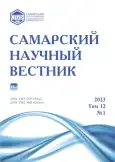Средняя профессиональная школа Казанского учебного округа в условиях модернизации российского образования конца XIX – начала XX века
- Авторы: Магсумов Т.А.1
-
Учреждения:
- Набережночелнинский государственный педагогический университет
- Выпуск: Том 12, № 1 (2023)
- Страницы: 273-280
- Раздел: Педагогические науки
- URL: https://journal-vniispk.ru/2309-4370/article/view/133979
- DOI: https://doi.org/10.55355/snv2023121307
- ID: 133979
Цитировать
Полный текст
Аннотация
Презентуются основные результаты исследований автора в области истории становления и развития отечественной дореволюционной средней профессиональной школы, осуществленные на материалах учебных заведений Казанского учебного округа. Историческая реконструкция производится на фоне и относительно специфики происходившей в стране модернизации, включавшей образовательную революцию. Базовым методом выступило обобщенное историко-генетическое описание результатов авторских исследований, а источником – совокупность этих исследований. Роль средних профессиональных школ в системе образования Казанского учебного округа на рубеже XIX–XX вв. заметно возросла. Став звеном происходившей в стране образовательной революции, средняя профессиональная школа выступила в качестве носителя традиций и проводника новаций, канала и активного участника модернизационных изменений. В развитии среднего профессионального образования четко отразились происходившие в стране модернизационные процессы. Автор воссоздает картину начального этапа истории среднего профессионального образования; раскрывает установки и практики государственно-общественного и частно-государственного взаимодействия в образовании; выявляет социальные характеристики учащихся и педагогов; восстанавливает процесс расширения числа и круга социальных агентов образовательных институций; раскрывает основные направления деятельности средних профессиональных школ. Несмотря на серьезные проблемы, обусловленные попытками осуществить ее развитие на традиционных основах, профессиональная школа, во многом благодаря государственно-общественному партнерству, внесла существенный вклад в подготовку квалифицированных кадров для экономики региона. Результаты исследования заключаются в приращении знания о развитии отечественного образования позднеимперского периода, в возможности их использования для последующей научной разработки проблематики, а также в теории и практике среднего профессионального образования на современном этапе.
Полный текст
Открыть статью на сайте журналаОб авторах
Тимур Альбертович Магсумов
Набережночелнинский государственный педагогический университет
Автор, ответственный за переписку.
Email: nabonid1@yandex.ru
кандидат исторических наук, доцент кафедры педагогики им. З.Т. Шарафутдинова
Россия, Набережные Челны, Республика ТатарстанСписок литературы
- Богуславский М.В. Вариативные стратегии модернизации российского образования в начале XX века // Проблемы современного образования. 2015. № 2. С. 5–18.
- Парсонс Т. Система современных обществ / пер. с англ. Л.А. Седова, А.Д. Ковалева; под ред. М.С. Ковалевой. М.: Аспект Пресс, 1998. 270 с.
- Бессолицын А.А. Поволжский регион на рубеже XIX–XX вв. (Основные тенденции и особенности экономического развития) // Экономическая история России: проблемы, поиски, решения. Вып. 5. Волгоград: Издательство Волгоградского университета, 2003. С. 190–202.
- Магсумов Т.А. Средняя профессиональная школа Казанского учебного округа в условиях модернизации отечественного образования конца XIX – начала XX в. Курск: Университетская книга, 2022. 535 с. doi: 10.47581/2022/magsumov.01.
- Магсумов Т.А. Казанские школяры на рубеже XIX–XX веков: облик, повседневность, среда. Саарбрюкен: LAP Lambert, 2011. 268 с.
- Магсумов Т.А. Источники по истории Российской средней профессиональной школы рубежа XIX–XX вв. // Вестник архивиста. 2012. № 1. С. 69–78.
- Magsumov T.A. Main approaches to the study of historical and educational process // Bylye Gody. 2014. № 34 (4). P. 720–726.
- Штомпка П. Социология социальных изменений / пер. с англ. под ред. В.А. Ядова. М.: Аспект Пресс, 1996. 416 с.
- Миронов Б.Н. Российская империя: от традиции к модерну: в 3 т. Т. 1. СПб.: Дмитрий Буланин, 2014. 896 с.
- Веселов А.Н. Среднее профессионально-техническое образование в дореволюционной России: очерки по истории. М.: Трудрезервиздат, 1959. 103 с.
- Кузьмин Н.Н. Низшее и среднее специальное образование в дореволюционной России. Челябинск: Южно-Уральское кн. изд-во, 1971. 280 с.
- Ищенко О.В. Студенческая и учащаяся молодежь как фактор общественного движения и культурной жизни Сибири (конец XIX – начало XX в.): монография. Омск: Изд-во Омского гос. ун-та, 2010. 498 с.
- Аминов Т.М. История профессионального образования в Башкирии. Начало XVII века – 1917 год: монография. 2-е изд., доп. и перераб. Уфа: Изд-во БГПУ, 2012. 296 с.
- Черкасов А.А., Братановский С.Н., Королева Л.А. Система народного просвещения на территории Черноморской губернии в 1896–1917 гг. Часть 2 // Вестник Санкт-Петербургского университета. История. 2020. Т. 65, № 4. С. 1067–1084. doi: 10.21638/11701/spbu02.2020.403.
- Cherkasov A.А., Bratanovskii S.N., Koroleva L.A. The public education system in Voronezh Governorate in the period 1703–1917. Part 1 // European Journal of Contemporary Education. 2020. Vol. 9, iss. 1. P. 202–211. doi: 10.13187/ejced.2020.1.202.
- Litvin A.A., Akhmetova A.R. «The new teacher» and «the new rule» in the context of the Bolshevik project of «Cultural revolution» // Журнал Министерства народного просвещения. 2015. № 4 (6). P. 251–261. doi: 10.13187/zhmnp.2015.6.251.
- Жарова Е.Ю. Профессора естественных отделений российских университетов 1850–60-х гг. и «вторичный импорт» науки // Современные исследования социальных проблем. 2021. Т. 13, № 4. С. 53–77. doi: 10.12731/2077-1770-2021-13-4-53-77.
- Кабытов П.С., Леонтьева О.Б. Подготовка научных кадров высшей квалификации по историческим наукам в Самарском университете // Вестник Самарского университета. История, педагогика, филология. 2019. Т. 25, № 4. С. 7–22. doi: 10.18287/2542-0445-2019-25-4-7-22.
- Пономарева В.В. Профессора и преподаватели Московского университета в закрытых женских институтах Ведомства учреждений императрицы Марии (первая половина XIX в. – 1917 г.) // Вестник Московского университета. Серия XXIII: Антропология. 2019. № 3. С. 128–138. doi: 10.32521/2074-8132.2019.3.128-138.
- Грибовский М.В. «Тягость профессорства»: особенности педагогической деятельности университетского преподавателя в дореволюционной России // Былые годы. 2019. Т. 3, № 53. С. 1263–1271. doi: 10.13187/bg.2019.3.1263.
- Ростовцев Е.А., Баринов Д.А., Сидорчук И.В. Кризис 1911 г. в провинциальных университетах // Былые годы. 2019. № 54 (4). С. 1877–1886. doi: 10.13187/bg.2019.4.1877.
Дополнительные файлы






